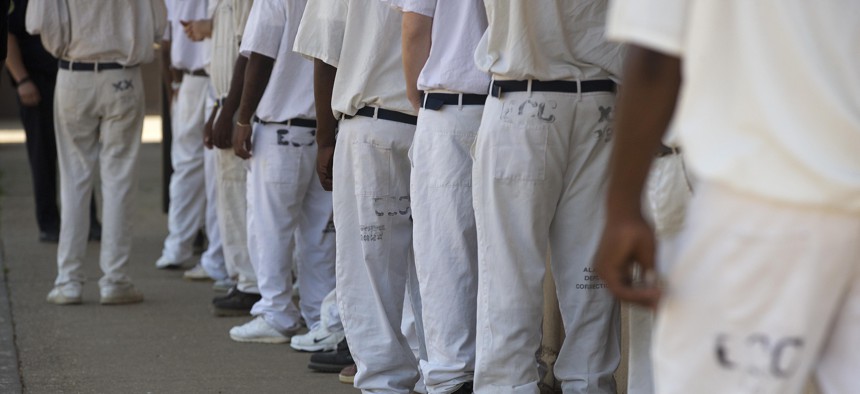Justice Department Says Alabama Prisons Plagued by Violence

In this June 18, 2015 file photo, prisoners stand in a crowded lunch line during a prison tour at Elmore Correctional Facility in Elmore, Ala. AP Photo
STATE AND LOCAL ROUNDUP | Mississippi city to stop jailing people unable to pay fines … Michael Brown’s mother loses council race in Ferguson, Missouri … New Mexico bans coyote-killing contests.
The U.S. Department of Justice on Wednesday gave Alabama 49 days to begin addressing what the federal agency characterized as an unconstitutional failure to protect inmates in the state’s 13 prisons for men. The department investigation found “crisis level” understaffing and an administrative culture that covers for, and sometimes appears to abet, cruelty and violence of “an unusual nature.” Department investigators, according to the Associated Press, reviewed more than 600 reported inmate sexual assaults over a 17-month period beginning in late 2016 without finding a single incident in which “a correctional officer or other staff member observed or intervened.” Rapes occur “day and night in all corners of the prisons,” and the prison administration has refused to turn over investigative files that the Justice Department subpoenaed during the course of its probe. A letter sent by the Justice Department to the state included dozens of recommendations for improvement, including hiring 500 new corrections officers immediately and three times that amount in subsequent months. In a statement, Gov. Kay Ivey said she committed to reform. “Over the coming months, my administration will be working closely with DOJ to ensure our mutual concerns are addressed..., making certain that this Alabama problem has an Alabama solution,” she said. [Associated Press, Department of Justice]
ENERGY | In a landmark move that comes in the face of fierce and high-spending industry opposition, the Colorado Legislature this week sent a bill to Gov. Jared Polis to overhaul the way oil and gas extraction is regulated, reversing decades old policy by making public health and safety the top priority instead of fostering development. The bill, supported by the governor, passed after years of intense debate and legal clashes fueled by a boom in hydraulic fracturing that saw drillers launch operations in cities and suburbs across the Front Range, including across the street from one of Polis’ residences. The bill will allow local governments to regulate oil and gas development, which has been the sole purview of the state. Meantime, NPR reports that utilities last year across the country moved at a record pace away from coal to cheaper and cleaner energy sources. [Denver Post, NPR/Wyoming Public Radio]
DEBTOR PRISONS | City Council members in Meridian, Mississippi, agreed this week to sign a deal with the Southern Poverty Law Center and MacArthur Justice Center to avoid legal action aimed at forcing the city to stop incarcerating poor people unable to pay legal fines and fees. The deal also will see the city stop using the bail system in misdemeanor cases. “When people are punished for their inability to pay…, jurisdictions have effectively made it a crime to be poor,” said Caren Short, attorney for the SPLC. As the New York Times reported in January, impoverished defendants in the U.S. owe an estimated tens of billions of dollars in criminal-justice fines and fees. [Meridian Star, New York Times]
CIVIL RIGHTS | This week Lesley McSpadden, mother of Michael Brown, the black teenager shot and killed in 2014 in Ferguson, Missouri, by police officer Darren Wilson, lost her bid to win a City Council seat. McSpadden is a member of “Mothers of the Movement,” the group of black women who have lost children to police and vigilante violence that played a central role in the rise of Black Lives Matter. McSpadden made police reform the centerpiece of her campaign. She is the second member of the “Mothers of the Movement” group to run for political office: Last year, Lucy McBath, whose son Jordan Davis was shot and killed in 2012, won election to Congress from Georgia’s Sixth District. [Vox]
WILDLIFE | New Mexico Gov. Michelle Lujan Grisham signed a bill this week outlawing coyote-killing contests in the state. Ranchers and hunting outfitters support the contests as a way to manage the threat coyotes pose to livestock. Opponents call the contests barbaric and ineffective. [Associated Press]
John Tomasic is a journalist who lives in Seattle.
NEXT STORY: ‘A Pileup of Inequities’: Why People of Color Are Hit Hardest by Homelessness





